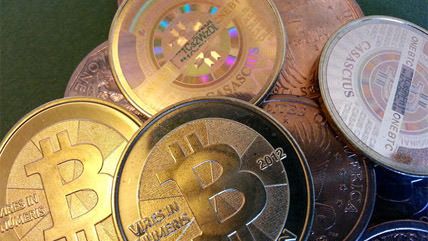It's Time To Grill the Federal Reserve About Bitcoin
Is the financial system ready for massive retailers to accept a competing currency?

When Janet Yellen arrives on Capitol Hill this week for her first Congressional testimony as chairman of the Federal Reserve, some enterprising senator or Congressman may want to ask her about Bitcoin.
The most provocative way to phrase it would be something like, "Chairman Yellin, what effect would it have on the dollar and the world financial system if some large online retailer such as Amazon or Walmart.com or even the online Apple Store were to announce that it was going to give customers the choice of paying in Bitcoin instead of in dollars?"
That's the direction in which things are headed, if one is to believe the Silicon Valley venture capitalists Ben Horowitz and Marc Andreessen, whose firm has reportedly invested more than $50 million in Bitcoin-related startups. (The Andreessen Horowitz firm lists Lawrence Summers, who served as Treasury secretary at the end of the Clinton administration and as chairman of the National Economic Council for President Obama, as a "special advisor.")
Andreesen recently wrote an article for the New York Times online Dealbook section extolling the virtues of the digital currency, likening it to the personal computer in 1975 and the Internet in 1993. And Horowitz recently bet a pair of alpaca socks against blogger Felix Salmon, the bet being, "Five years from now, in January, 2019, we'll poll a representative sample of Americans. If 10 percent or more say they have used bitcoin to buy something in the past month, Ben wins. If it's fewer than 10 percent, Felix wins."
To me the Bitcoin phenomenon illustrates at least two important concepts: competition is good, and technology moves faster than lawmakers or regulators do.
America is all about virtuous competition. Think of Harvard and Yale, the New York Times versus the Wall Street Journal, Apple's iPhone versus Google's Android mobile operating system, Macintosh versus Windows, Coke versus Pepsi, McDonald's versus Burger King, Red Sox versus Yankees. If things work the way they are supposed to, the healthy competition drives improvements and efficiencies that benefit consumers and shareholders.
As things stand today, the dollar has some competition as a store of value and as a medium of exchange from other commodities, assets, and currencies, such as gold, the Euro, and the Yen. As a new competitor, Bitcoin may help to keep the custodians of the dollar on their toes.
The regulatory point also applies. Of all the costly Washington battles over the past few years, the one over the "Durbin Amendment" to the Dodd-Frank Law, limiting debit card interchange fees that banks charged retailers, was one of the most cringe-inducing for anyone other than the Washington lobbyists who got rich from it. Bloomberg News reported that the dispute involved more than 500 lobbyists who were paid about $30 million in fees. Yet as Senator Durbin and the Federal Reserve tried to tell banks that they could only charge retailers a 24-cent interchange fee on a $38 transaction, Bitcoin is coming into the game with an interchange fee that approaches zero.
Yellin said last year that she had been "trying more carefully to understand what the concerns are with these new payment mechanisms." Her immediate predecessor as chairman of the Federal Reserve, Ben Bernanke, told senators in November, echoing the economist and former Fed vice chairman Alan Blinder, that "while these types of innovations may pose risks related to law enforcement and supervisory matters, there are also areas in which they may hold long-term promise, particularly if the innovations promote a faster, more secure and more efficient payment system."
The cashless economy, once a techno-utopian dream, is now approaching reality. Even Hillary Clinton's spokesman Philippe Reines was recently quoted about how he hadn't withdrawn any cash from the bank since June 2012.
There are a whole variety of ways that Yellin may want to break with Bernanke's legacy at the Fed. But one point where continuity might inspire confidence would be if she were to convey that she shares his view that digital currency is a potentially promising development rather than a dangerous threat to the dollar's monopoly.


Show Comments (11)